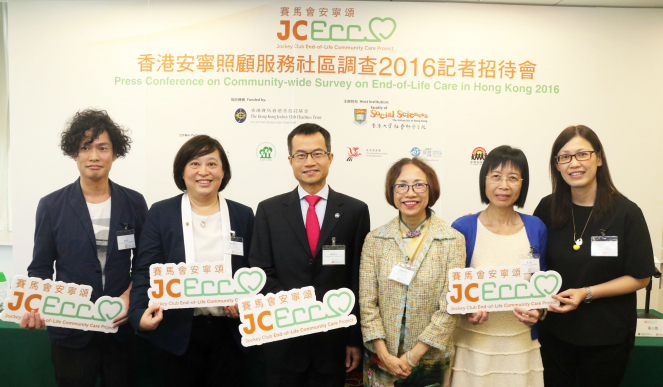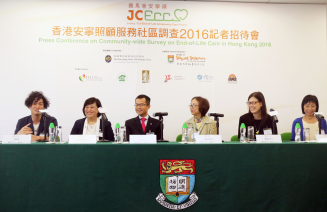Media
(Issued on behalf of HKU Faculty of Social Sciences) Press Conference on Community-wide Survey on End-of-Life Care in Hong Kong 2016
01 Nov 2016

(From left) Simon, Cheering Practitioner, JCECC: Cheering@Home End-of-Life Care Services; Dr Amy Chow, Associate Professor, Department of Social Work and Social Administration, Faculty of Social Sciences, HKU, & Project Director of JCECC; Mr. Leong Cheung, Executive Director, Charities and Community, The Hong Kong Jockey Club; Professor Cecilia Chan, Professor, Department of Social Work and Social Administration, Faculty of Social Sciences, HKU, & Project Director of JCECC; Ms Wong, Family member of service recipient from JCECC: Cheering@Home End-of-Life Care Services; and Ms Alvina Chau, Manager, Continuing Care, St. James' Settlement.
Hong Kong is facing a rapidly ageing population, and the number of elderly suffering from terminal illnesses has also escalated correspondingly, resulting into a growing demand for end-of-life care services in the community. Subsequent to the launch of The Hong Kong Jockey Club Charities Trust-funded “Jockey Club End-of-Life Community Care Project” (JCECC) in January 2016, the HKU Team ran a three-phase community-wide survey on end-of-life care (EoLC) in Hong Kong and the first phase of the survey was conducted between January and March 2016 with the assistance of the HKU Social Sciences Research Centre. The survey aims to measure the changes in knowledge, attitudes and preferences with regard to EoLC among Hong Kong citizens, so as to evaluate the impact of Project. The survey has collected data from 1,600 Hong Kong citizens aged 18 years old or above with a response rate of 62%.
The Hong Kong Jockey Club has been proactively responding to the challenges that arise from the city’s ageing population trend. Building an age-friendly Hong Kong is one of three areas of strategic focus for its community contributions. “The Club hopes to enhance public understanding of community EoLC. In this way our citizens can make informed choices about care options and face the end of their life calmly and with dignity,” Mr. Leong Cheung, Executive Director of Charities and Community of The Hong Kong Jockey Club explained.
Dr. Amy Chow, Project Director of JCECC and Associate Professor of the Department of Social Work and Social Administration of the Faculty of Social Sciences, HKU announced the survey results. The survey results showed that although hospitals remained the most popular choice for EoLC provision, general public still considered other community settings such as social service agencies (72%), elderly and nursing homes (72%) and domestic homes (54%) to be plausible places for EoLC provision.
Also, the survey identified that a majority of respondents supported community EoLC. 82% of them supported EoLC facility to be built nearby, 76% and nearly 60% of them also supported their neighbors’ choice to receive EoLC at home or even die at home respectively. Moreover, the survey indicated that over half of the respondents hoped to receive EoLC at home while around one-forth of them want to die at home. Besides the concerns on a community-focused EoLC, an indispensable connection between psycho-social care and EoLC is manifested in this survey.
Specifically, amongst the EoLC elements those the respondents mentioned, 45% of the elements were related to psycho-social care, namely counselling/ psychological support and spiritual care. Furthermore, the connection with family members/friends was most frequently mentioned when respondents were asked to name the most important issue and wishes in the last 6 months of their lives. The survey results also showed the crucial roles of self-determination and family communications in the EoLC decision making. 84% of respondents believed that when facing the final journey of their life, they should be the one making their own EoLC decisions, rather than doctors, family members or others. Over 70% said they would have discussions with their families before making an EoLC decision and choosing their preferred place of death.
Dr. Chow explained that the survey result aligned with the direction of JCECC. Community EoLC service is one of the important components in EOLC. The Project Team will design suitable EoLC training and public education based on the result. The Project aims to increase the quality of life of end-of-life patients and their family members by providing holistic end-of-life care with the focus of community and psycho-social care and encourage family communications, with the vision of “Care for the Community, Care to the Community, Care by the Community”. The EoLC innovative services models can set up a blue-print for the end-of-life community care development in Hong Kong in the future.
Professor Cecilia Chan, Project Director of JCECC and Professor of the Department of Social Work and Social Administration of the Faculty of Social Sciences, HKU explained that there is a strong correlation between the survey results, the government findings and community EoLC services in JCECC Project. The survey results not only facilitate the design of suitable training and education for the stakeholders, but also reflect the impact of the five NGO innovative services on community EoLC.
Ms. Alvina Chau, representative of JCECC project partner St. James’ Settlement; Simon, a service volunteer and Ms. Wong, the family member of service recipient also shared the experience in the Project’s innovative EoLC service. They all agreed that the holistic community EoLC service provided by the Project is successful and the general public will be more likely to accept the service because of this pilot service.
For media enquiries, please contact
- Mr. Tommy Fan, Faculty of Social Sciences, HKU (Tel: 39171204 / 97010777; email: yhfan@hku.hk)
- Miss Rhea Leung, Communication and Public Affairs Office, HKU (Tel:28578555 / 90227446;
email: rhea.leung@hku.hk)
About “Jockey Club End-of-Life Community Care Project”
Hong Kong is facing a rapidly ageing population, and the number of elderly suffering from terminal illnesses has also escalated correspondingly. In view of the growing demand for end-of-life care services in the community, The Hong Kong Jockey Club Charities Trust approved HK$131 million to launch the “Jockey Club End-of-Life Community Care Project” (JCECC) in 2015. The project is a three-year initiative aimed at improving the quality of end-of-life care, enhancing the capacity of service providers, as well as raising public awareness.
JCECC is a multi-disciplinary, multi-institutional and cross-sectoral collaboration to help enhance end-of-life care in Hong Kong with special emphasis on the interface between social and medical systems. Five service models are being developed and piloted in the community to provide holistic support to elderly people suffered from terminal illness. The goal is to enable the city’s older people to have informed choices of care and enjoy an improved quality of life. Please visit http://www.JCECC.hk/.

